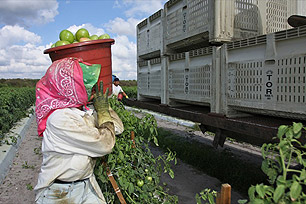
Nightmarish complaint underscores value of
Fair Food Program
In early 2009, two women walked into the CIW office complaining of some truly horrific conditions at an Immokalee tomato farm, one of the largest tomato growers in Florida. Here, excerpted from a story on last week’s settlement of the EEOC charges stemming from their complaint, are some of the details of their story:
| “… The women, who worked in DiMare Ruskin’s Immokalee fields for three months, were sexually harassed by supervisors then fired when they complained, the suit alleged.
The complaint details how father-and-son crew leaders, Ricardo and Richard Lee Campbell, bullied the women. The elder Campbell, for example, told one woman he wanted to kiss her all over her body and on her breasts, that he wouldn’t stop pursuing her, told her she’d regret turning him down because he was well-endowed and forced her hand to his crotch.” read more |
Many more details emerged, most of them too vile to repeat here. But suffice it to say that, even by the dismally low standards of the fields, the picture of a hostile workplace painted by the women was exceptional for its harshness and depravity.
There was no Fair Food Program at the time — in fact, the Florida Tomato Growers Exchange was still fighting the Campaign for Fair Food tooth and nail — and so CIW staff members listened to the women’s complaints, informed them of their rights, and helped get them in contact with federal authorities at the Equal Employment Opportunity Commission (EEOC).
And this past week, three and a half years — and many depositions, affidavits, and legal motions — later, the women who walked into the CIW office to seek justice found some measure of relief for the humiliation they suffered at the hands of their supervisors in the tomato harvest.
From the EEOC’s press release announcing the settlement:
| “DiMare Ruskin, Inc., a Florida-based tomato grower and produce provider, will pay $150,000 to two female farmworkers and take other steps to prevent and address unlawful harassment and retaliation at its farms and facilities nationwide as part of a three-year consent decree that will resolve a lawsuit brought by the U.S. Equal Employment Opportunity Commission (EEOC), the agency announced today…
… As required by the three-year consent decree settling the suit, DiMare Ruskin will establish a nationwide anti-harassment policy for employees to use to communicate complaints to the company. Further, DiMare Ruskin will provide nationwide training to its management and non-management employees on the anti-discrimination laws enforced by EEOC, and will provide information to EEOC concerning its handling of discrimination complaints for three years.” read more |
 The settlement is good news for everyone involved, first and foremost, of course, for the women who suffered the abuse first-hand (and for their families, as both of the complainants are wives and mothers outside of their jobs in the fields). It is also good news for all the workers from this day forward at DiMare Ruskin Farms who will undoubtedly benefit from the changes brought about through the courage and tenacity of these two remarkable women.
The settlement is good news for everyone involved, first and foremost, of course, for the women who suffered the abuse first-hand (and for their families, as both of the complainants are wives and mothers outside of their jobs in the fields). It is also good news for all the workers from this day forward at DiMare Ruskin Farms who will undoubtedly benefit from the changes brought about through the courage and tenacity of these two remarkable women.
But the settlement is not just good for the workers, it is good for the Florida tomato industry as a whole. For too long, the industry responded to accusations of farm labor abuse with denial and opposition, and this settlement is a vestige of that approach. But today there exists a better way forward embraced by the vast majority of Florida growers, the Fair Food Program, based on an honest, transparent, and compassionate partnership between farmworkers and their employers. This latest settlement can only reinforce for tomato industry leaders — and for the supermarket giants like Publix, Kroger, Ahold, and Walmart that buy their produce — the wisdom of this new approach.
Labor abuse in the fields is real, and it won’t go away by sticking our heads in the sand. Rather we have to confront that reality, work together to expose and eliminate the abusers, and move forward together as a stronger industry. If we do that, if the Fair Food Program continues to grow and thrive, we can look forward to the day when sexual harassment complaints like this one will be a thing of the past.
Until then, industry leaders that continue to fight the Fair Food Program — growers and retail purchasers alike — need to look deep within themselves and ask how they can, in good conscience, stand aside and do nothing while another young child’s mother is abused in the fields.
